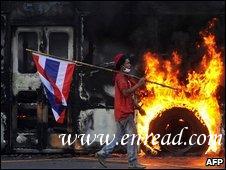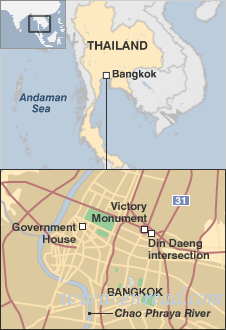| ||||||||||||||||||||||||||||||||||||||||||||||||||||||||||||||||||||||||||||||||||||||||||||||||
|
Thailand's prime minister has told the BBC that troops have brought Bangkok under control after a day of battles with anti-government protesters. 泰国首相已经告诉BBC,经过与反政府者一天的战斗后,军队已经使曼谷的局势处于掌控之中。 But a day marked by repeated violence ended with two people killed and dozens injured in clashes between residents(居民) and protesters near Government House. PM Abhisit Vejjajiva told the BBC that people were entitled to carry out peaceful protests - but not to riot(暴乱). "We are confident that we are in control of the situation," he said. Later, Mr Abhisit confirmed the deaths of two people in clashes at Government House. "We have taken measures(采取措施) which have finally brought the situation under control, except around Government House," he said. "However this evening we sadly had clashes(冲突) between demonstrators() and local residents, and we are informed that two local people have been killed and several have been injured by gunshots." After days of gathering3 protests by supporters of ousted4 Prime Minister Thaksin Shinawatra - who want Mr Abhisit to resign(放弃,辞去) - Monday saw a dramatic escalation5(自动调整,不断增加) on the streets. Soldiers were seen firing their guns into the air and into the crowds, while protesters burnt buses and threw firebombs in retaliation(报复,报仇). By Monday evening, most of the remaining protesters on Bangkok's streets - said by Mr Abhisit to number no more than 20,000 - were concentrated around Government House, the prime minister said. BBC correspondent Jonathan Head, in Bangkok, says political turmoil has disrupted(混乱,干扰) life in Thailand for so long now that it is easy to forget the country was once seen as a paragon(模范,优秀之人) of stability. The situation in Bangkok was fluid(液体的,流动的) throughout the day, our correspondent says, with soldiers at times showing restraint(抑制,束缚), but at other times being undisciplined(难以控制的). Monday is the start of a three-day holiday for the Thai New Year, and some protesters handed out pink roses to soldiers as a sign of peace. But in a BBC interview, Mr Thaksin said: "The situation in Thailand is of very brutal6(野蛮的) suppression(镇压,抑制)." And he clarified(澄清) his previous call to supporters for a revolution, saying he meant a "peaceful revolution". "All the protesters come with bare hands, they come with peace, they are asking for a true democracy for all," he said, although he did acknowledge(承认) that some had "sticks and stones". 'They cannot riot' Mr Abhisit, the current prime minister, declared a state of emergency on Sunday after the protests forced the cancellation7 of a major meeting of Asian leaders in the resort city of Pattaya. But Army spokesperson Col Sansern Kaewkamnerd said soldiers were not firing real bullets in Monday's clashes. "If the protesters show that they intend to hurt the officials, we will use military training rifles(步枪) on them with blank bullets made from paper, which will not hurt the protesters." Speaking to the BBC from the Middle East, Mr Thaksin accused the army of lying about the shooting in Bangkok, saying that soldiers had not fired into the air as the army said, but into crowds with live ammunition(军火,弹药). Earlier, Mr Abhisit said 70 people had been injured, including 23 soldiers. He added: "If the people want to demonstrate peacefully, if they want to exercise their constitutional(组织的,立宪的) rights they are welcome to do so, but they cannot riot, they cannot incite8(刺激,引诱) people to break the law, they cannot intimidate9(威胁,恐吓) and use violence against other people." "We will try to find the best solution we can over the next couple of days," he added. Under the current state of emergency, gatherings10 of more than five people can be banned, media reports can be censored11(检查) and the army can be deployed12(配置,部署) to help police maintain(维持秩序) order. 点击  收听单词发音 收听单词发音
|
||||||||||||||||||||||||||||||||||||||||||||||||||||||||||||||||||||||||||||||||||||||||||||||||
- 发表评论
-
- 最新评论 进入详细评论页>>





